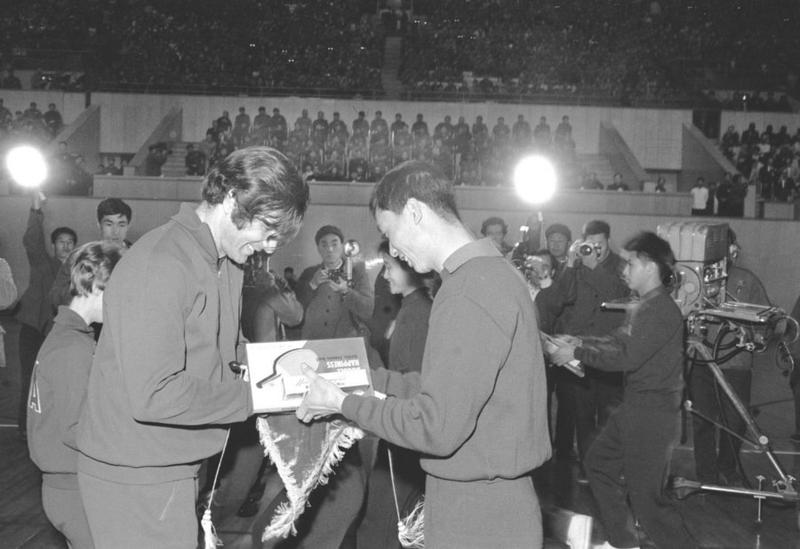 Table tennis players from China and United States exchange gifts at a reception hosted by the All-China Sports Federation in Beijing on April 13, 1971. (QI TIEYAN/XINHUA)
Table tennis players from China and United States exchange gifts at a reception hosted by the All-China Sports Federation in Beijing on April 13, 1971. (QI TIEYAN/XINHUA)
BEIJING - Fifty years ago, with an unexpected yet fortunate encounter, Chinese and American ping-pong players broke through deeply entrenched ideological barriers and started a world-reshaping process that eventually re-coupled their countries after 20 years of mutual hostility and isolation.
When US ping-pong player Glenn Cowan accidentally boarded the bus carrying the Chinese team on that spring day in 1971, in the middle of the Cold War, he received from the Chinese players gestures of goodwill and respect, instead of acts of hostility
Half a century later, with a visible force in Washington attempting to decouple the two already closely intertwined major world players to the detriment of the global good, it bears particular significance to revisit the wonderful legacy and tap once again into the power of ping-pong diplomacy.
What can be learned from the legendary story is that differences of cultural inheritance and political systems are not real obstacles to people-to-people exchanges, and, more importantly, that the two countries have the courage and wisdom to steer their relationship in the right direction.
When US ping-pong player Glenn Cowan accidentally boarded the bus carrying the Chinese team on that spring day in 1971, in the middle of the Cold War, he received from the Chinese players gestures of goodwill and respect, instead of acts of hostility.
READ MORE: Ping-pong diplomacy broke the mold
Their amicable interactions helped the two long-estranged nations know more and better about each other. Political leaders in both countries seized the positive momentum and pushed forward their endeavor to normalize bilateral relations, which led to the establishment of China-US diplomatic ties eight years later. The small ball moved the big world.
Over the decades, mutual knowledge between the Chinese and Americans has snowballed, and their interactions have made great strides, delivering tremendous benefits to the two countries and the rest of the world.

The two countries now have 50 pairs of sister provinces and states and 231 pairs of sister cities. Also, China has been one of the largest sources of international students in the United States for years.
What China and the United States have achieved in the past decades shows that nations and peoples with different systems and values can respect one another and live together in peace, as long as they have the will to manage differences and look farther than their living time for greater and long-term benefits
On the economic front, their bilateral trade has seen an incredible soar from almost negligible US$2.5 billion in the late 1970s to roughly 600 billion last year.
What China and the United States have achieved in the past decades shows that nations and peoples with different systems and values can respect one another and live together in peace, as long as they have the will to manage differences and look farther than their living time for greater and long-term benefits.
Sadly, over the past four years, some China hawks in Washington tried to decouple the world's top two economies. They waged trade wars, obstructed normal bilateral scientific cooperation, imposed restrictions on Chinese students and travelers, and peddled preposterous lies about China over the pandemic. Those actions have severely harmed what many deem as the world's most important bilateral relationship.
ALSO READ: China-US ping-pong diplomacy 2.0 served up
It is indeed another vital moment of choosing for the world's two major countries. Five decades ago, the then leaders of China and the United States had chosen to seize the chance created by their athletes, and ended the estrangement between the two countries. The world community marveled at their political courage and acumen.
As Chinese President Xi Jinping said in his telephone conversation with his US counterpart Joe Biden on the eve of the Spring Festival in February, it is the common desire of both peoples and the wider international community to see a sound and stable development of China-US relations.
Although the days of ping-pong diplomacy are quite different from those of today, cooperation and communication remain the only way forward for the two sides. In fact, China and the United States are facing even greater opportunities as well as demands to work with each other in a world of rising global challenges and expanding interdependence.
Thus, decision-makers in Washington should join Beijing in growing the people-to-people relationship between the two countries. That may start with Washington rolling back all the toxic measures slapped by the previous US administration so as to normalize the exchanges between the two nations.
Decoupling is not, and should never be, an option. For the interests of both countries and those of the wider world community, policymakers in Washington should exercise the kind of courage and wisdom their predecessors demonstrated half a century ago, and make the bold and right choice.


